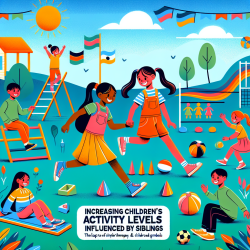Introduction
As practitioners in the field of speech-language pathology, our ultimate goal is to create positive outcomes for children. Understanding the complex interplay of psychosocial factors, such as those highlighted in the study "Psychosocial Factors Associated with Substance Abuse and Anxiety on Immigrant and U.S. Born Latinos," can significantly enhance our practice. This research provides valuable insights into how these factors impact substance abuse and anxiety, offering pathways to improve therapeutic interventions for Latino children.
Understanding the Research
The study conducted by Lopez-Tamayo et al. (2017) explores the influence of psychosocial factors on substance abuse and anxiety among Latino adults. It highlights generational differences, with immigrant Latinos showing different psychosocial patterns compared to their U.S. born counterparts. Key findings include:
- Affiliation to U.S. culture is linked to substance abuse among immigrants, while it reduces substance use in U.S. born Latinos.
- Formal education and full-time employment are associated with reduced anxiety in immigrants.
- Social support plays a crucial role in reducing substance use among U.S. born Latinos.
Implications for Practitioners
These findings can inform speech-language pathologists in several ways:
- Cultural Sensitivity: Understanding the role of cultural affiliation can help tailor interventions that respect and incorporate the child's cultural background, potentially reducing anxiety and improving engagement.
- Educational Support: Encouraging educational attainment and supporting academic language skills can be pivotal in reducing anxiety, particularly for immigrant children.
- Family and Social Networks: Leveraging the child's social networks and family support can enhance therapy outcomes, especially for U.S. born Latino children.
Encouraging Further Research
The study underscores the need for more research into the psychosocial factors affecting Latino children. Practitioners are encouraged to engage in or support research that delves into:
- The impact of bilingualism and biculturalism on language development and anxiety.
- The role of socioeconomic factors in therapy access and outcomes.
- Effective strategies for involving family and community in the therapeutic process.
Conclusion
By integrating these insights into practice, speech-language pathologists can better support Latino children, addressing both their linguistic needs and the psychosocial factors that impact their development. This holistic approach not only enhances therapy outcomes but also contributes to the overall well-being of the child.
To read the original research paper, please follow this link: Psychosocial Factors Associated with Substance Abuse and Anxiety on Immigrant and U.S. Born Latinos.










